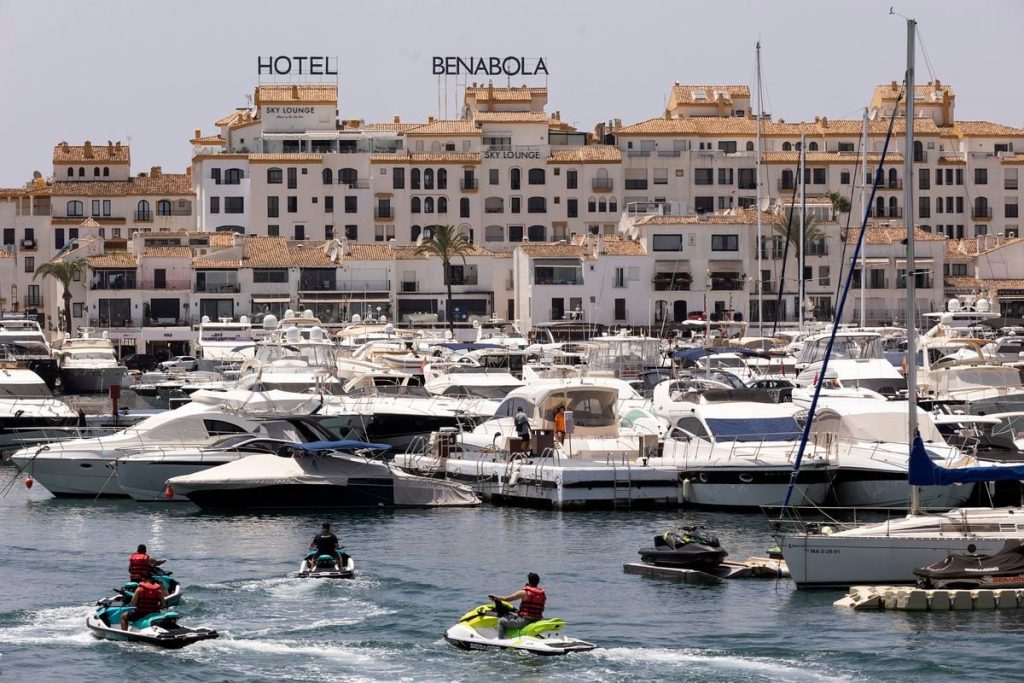In Nueva Andalucía, a district to the west of Marbella (Málaga), there are grocery stores, tobacco shops, kiosks, restaurants, banks, and real estate agencies. Although everything seems normal in this area, the constant procession of high-end cars on the streets and the hundreds of security cameras indicate a certain uniqueness. The shattered glass of a café with bullet holes sets it apart. Every person here has a memory, experience, or anecdote related to organized crime. No one wants to give their name to avoid drawing attention, but most do so casually. A delivery driver near Julio Iglesias Avenue, close to where the last of three gun incidents occurred in the area in just over a month, comments, “We are used to it. At least they only kill each other.”
The shootings in the café on March 16, the shots that shattered the window of a restaurant just five days earlier, and the street where a Swedish gunman fired multiple times at two compatriots on February 10 are separated by just a kilometer. They form a triangle in the heart of Nueva Andalucía, a residential and leisure area that includes Puerto Banús, the epicenter of Marbella luxury. While the area is frequented by wealthy visitors from around the world, it is also a favorite entertainment spot for drug trafficking gangs based on the Costa del Sol. Disputes over market share, rivalries, or thefts of merchandise sometimes escalate to the use of firearms. “Not much happens,” says a police officer with extensive experience in the area. “There are many organizations in a small space. There are frictions, and sometimes the balance is disrupted,” explains another officer. This leads to settling of scores, murder attempts, or simple warnings, all within a context where tourists are already present year-round, and the actual population easily doubles the official figures, even in winter.
According to police sources, the recent gun incidents are not related, they are part of the “usual dynamic” of the area, and it was a coincidence that they occurred in such a short period. The two latest episodes are linked to rivalries between drug traffickers of different nationalities. One incident involved a motorcyclist shooting multiple times at a restaurant frequented by celebrities and footballers, such as Erling Haaland, as seen on the restaurant’s website. Another incident occurred when a man fired several shots at a café, injuring a 20-year-old in the knee, who was hospitalized. A police officer comments that they were targeting him, to kill him. However, investigators insist that these incidents involve different profiles and groups, and they are not connected. The use of firearms is occasionally related to drug trafficking or heated arguments.
The first of these incidents occurred on February 10 when a man got out of a car, fired at least nine times at two other men (one was injured in the leg and arm), and then fled, tossing the weapon into bushes. This incident was attributed to a feud between Swedish clans, with links to a criminal network based in Stockholm, according to Swedish media. Cooperation between Swedish police and the National Police has been crucial in resolving the case, leading to three arrests. Swedish police, focusing on combatting drug networks spread across Europe, note that gangs from Sweden have moved to the Costa del Sol due to proximity to drug routes, presence of partners in the area, anonymity, good weather, and ease of money laundering. The violence brought to Marbella in 2018 by the clan known as “Los Suecos”, involved in two murders, has already left Spain.
The area is heavily monitored with surveillance cameras, both municipal and private, providing vital evidence in numerous cases, such as the capture of individuals involved in murders like “Los Suecos”. The recent arrests of a shooter and his accomplices were made by the Organized Crime Unit, belonging to the Drug and Organized Crime Unit of the Costa del Sol. This specialized team, created in 2019 to handle the rising number of score settlings in Marbella, has been successful in resolving cases, usually in collaboration with Udyco groups in Marbella. Despite the incidents in Marbella attracting attention, police emphasize that security in the Costa del Sol is much higher compared to countries like Sweden, the Netherlands, or Belgium, where mafia wars result in deaths every year. Tourists and residents, although aware of the situation, feel relatively safe due to police presence and the belief that incidents are isolated.
While tourists and residents may witness or capture incidents on video, they often consider themselves immune to danger. The police’s control over the area and the semblance of order are comforting to many, despite occasional disturbances by individuals carrying weapons. As a local business owner recalls an incident involving a man with guns at her store, she emphasizes the sense of security in the area, encouraging visitors not to be alarmed. Despite the occasional incidents involving firearms in Nueva Andalucía, residents and authorities are hopeful that law enforcement will swiftly resolve the cases and maintain order in the region. The presence of various criminal organizations operating in the area reflects the broader issue of drug trafficking and organized crime along the Costa del Sol, but efforts are being made to ensure the safety and security of the local community and visitors alike.















